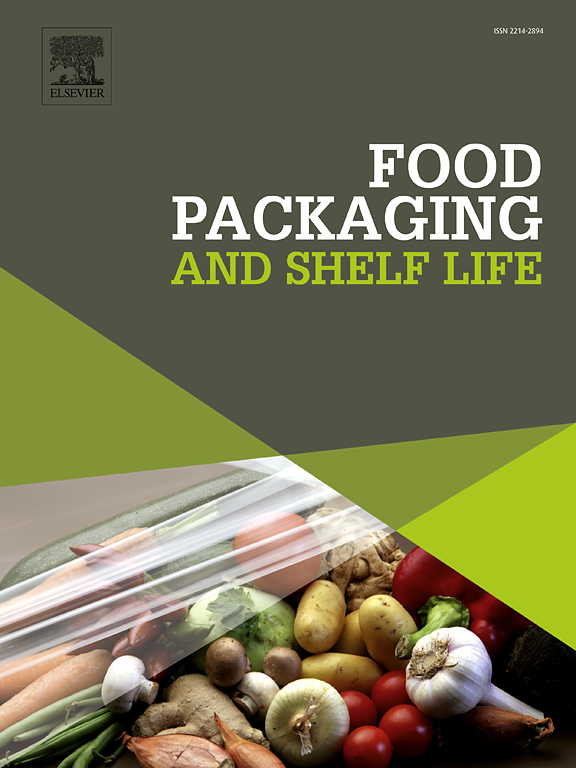Bacterial cellulose containing antimicrobial agent from expired drinks as sustainable food absorbent pad
IF 8.5
1区 农林科学
Q1 FOOD SCIENCE & TECHNOLOGY
引用次数: 0
Abstract
202 use of commercial food absorbent pads (CFP) to keep meat and poultry fresh by absorbing liquids is insufficient as microorganisms can still grow and cause food spoilage. Furthermore, CFP are made from non-biodegradable materials, which can be replaced with bacterial cellulose (BC) produced using expired drinks. Using expired drinks as a fermentation medium can reduce waste and provide an eco-friendly option to produce BC. BC has unique properties such as high water holding capacity (WHC), high tensile strength, biodegradability, and high fibre content, making it suitable as an absorbent pad for food applications. The objective of this study was to evaluate the potential of BC produced from expired drinks that were incorporated with potassium sorbate, an antimicrobial agent as active food packaging (BCPS). Physicochemical aspect such as surface morphology, biodegradability, WHC and antimicrobial properties were evaluated. Next, a shelf-life study on chicken cuts during refrigerated storage (4ºC) was conducted. Result of antimicrobial test shows positive results against selected pathogens such as E. coli, S. aureus, and S. Typhimurium. Up to 38 % of BCPS have degraded compared to only 5 % CFP after 29 days buried in soil, suggesting its biodegradable properties. A 14-day shelf-life study showed chicken cuts packaged with BCPS showed a longer estimated shelf-life of 11 days for both microbial and yeast growth compared to 2 and 6 days for CFP, respectively. To conclude, active BC packaging with antimicrobial properties was proven to extend shelf-life period of chicken cuts compared to CFP with the potential to be commercialized.
从过期饮料中提取含抗菌剂的细菌纤维素作为可持续食品吸收垫
使用商业食品吸收垫(CFP)通过吸收液体来保持肉类和家禽的新鲜是不够的,因为微生物仍然可以生长并导致食物变质。此外,CFP由不可生物降解的材料制成,可以用过期饮料产生的细菌纤维素(BC)代替。使用过期饮料作为发酵介质可以减少浪费,并为生产益生菌提供了一个环保的选择。BC具有独特的性能,如高保水能力(WHC),高拉伸强度,可生物降解性和高纤维含量,使其适合作为食品应用的吸收垫。本研究的目的是评估加入山梨酸钾(一种抗菌剂)作为活性食品包装(BCPS)的过期饮料所产生的BC的潜力。物理化学方面,如表面形态,生物降解性,WHC和抗菌性能进行了评价。接下来,对鸡肉块在冷藏(4ºC)条件下的保质期进行了研究。抗菌测试结果显示对大肠杆菌、金黄色葡萄球菌和鼠伤寒沙门氏菌等选定病原体呈阳性。在土壤中埋藏29天后,高达38 %的BCPS降解,而只有5 %的CFP,这表明BCPS具有可生物降解的特性。一项为期14天的保质期研究表明,与CFP包装的2天和6天相比,用BCPS包装的鸡肉块的微生物和酵母生长的保质期分别为11天。总之,与CFP相比,具有抗菌特性的活性BC包装被证明可以延长鸡肉切块的保质期,具有商业化的潜力。
本文章由计算机程序翻译,如有差异,请以英文原文为准。
求助全文
约1分钟内获得全文
求助全文
来源期刊

Food Packaging and Shelf Life
Agricultural and Biological Sciences-Food Science
CiteScore
14.00
自引率
8.80%
发文量
214
审稿时长
70 days
期刊介绍:
Food packaging is crucial for preserving food integrity throughout the distribution chain. It safeguards against contamination by physical, chemical, and biological agents, ensuring the safety and quality of processed foods. The evolution of novel food packaging, including modified atmosphere and active packaging, has extended shelf life, enhancing convenience for consumers. Shelf life, the duration a perishable item remains suitable for sale, use, or consumption, is intricately linked with food packaging, emphasizing its role in maintaining product quality and safety.
 求助内容:
求助内容: 应助结果提醒方式:
应助结果提醒方式:


